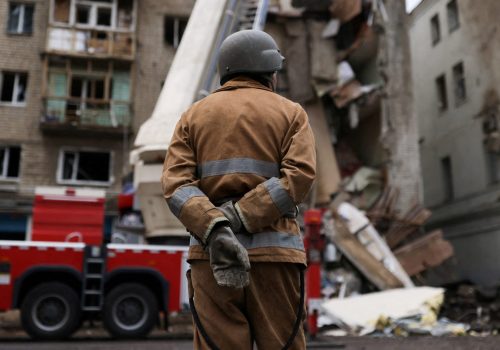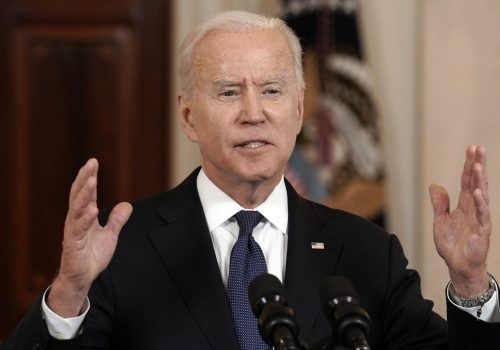Some illusions die hard; others have a short shelf life. Moscow’s July 23 attack on port facilities in Odesa—which came less than twenty-four hours after Moscow and Kyiv signed separate agreements with Turkey and the United Nations (UN) to unblock Ukraine’s Black Sea ports—illustrates both points.
In exchange for ending the Russian blockade on Ukraine’s grain exports, the Kremlin received assurances that Western sanctions did not apply to fertilizer, opening the way to export sales. The deal was aimed at avoiding food shortages—if not full-on famine—in Africa, the Arab world, and across much of Asia.
But this is the first illusion: For months, Moscow’s blockade has been designed, among other things, to produce pain in the Global South and raise pressure on the West to force Ukraine into an unsatisfactory peace with Russia. While Russian President Vladimir Putin has been called out by the United States, NATO, and the European Union for this cynical policy, he has faced no criticism from the actual victims of the policy. For instance, during a June trip to Moscow, Senegalese President Macky Sall, the current African Union chief, echoed Kremlin talking points that the food shortages were a result of the ongoing war and Western sanctions rather than Moscow’s blockade. This week, Foreign Minister Sergei Lavrov is certainly looking for more allies during his charm offensive in Africa.
The July 22 agreements took the UN and Turkey weeks to negotiate, but there was only one problem: Moscow had no reason (and probably no intention) to honor the deal. Its blockade was working. Pressure on the West was rising, and Moscow was paying no political price for the food shortage it was creating. It was not even clear why Moscow felt the need to go through the charade of signing the agreement. Whatever the case, its missile strike on Saturday ended that charade quickly—and with it, the illusion that the food crisis had been averted.
This leads to the other illusion. The Biden administration understands that the United States has a major interest in ensuring that Moscow’s war on Ukraine ends in failure—which requires substantial support from Washington and its allies and partners in the West. It also understands that a Moscow-manufactured food shortage would produce a humanitarian disaster and send refugees streaming into Europe. Yet it is still under the illusion that it can achieve its objectives by slow half-steps—fooling itself that permitting Moscow to deter the United States from taking more resolute steps is actually the prudent policy of avoiding, as National Security Advisor Jake Sullivan recently underscored, “a third world war.”
Time after time since Moscow began massing its troops on Ukraine’s borders, the administration has delayed sending Ukraine the weapons it needs for fear of provoking the Kremlin. Then, when it eventually sends some of those weapons, it finds that—somehow—it has indeed avoided World War III. Yet for some reason, the illusion persists. When it comes to the food crisis, Adm. James Stavridis, the former NATO supreme allied commander, has described how a humanitarian naval corridor could be set up almost entirely within the territorial waters of NATO littoral states in the Black Sea. But the White House has ruled out a US-led naval convoy to ensure grain shipments. If the Biden administration is to redeem its inaction, now is the time to seriously reconsider this decision.
It is a coincidence that the Black Sea agreements were signed the same day Sullivan made his comments to explain why the White House wouldn’t send long-range artillery to Ukraine. But perhaps it is no coincidence that Moscow—seeing once more how easily it can deter Washington by waving its nuclear wand—decided to immediately break the grain-export agreement and underscore its malign intention to provoke a food crisis in the Global South.
The Biden team is blowing an uncertain trumpet as it tries to project US leadership, resulting instead in supporting Ukrainian efforts to merely stave off Russian forces rather than deal them a decisive blow. But this is self-defeating. No wonder Macky Sall is mouthing Kremlin talking points.
John Herbst is the senior director of the Atlantic Council’s Eurasia Center and a former US ambassador to Ukraine.
Further reading
Mon, Jul 11, 2022
Four (updated) ways the war in Ukraine might end
New Atlanticist By Barry Pavel, Peter Engelke, Jeffrey Cimmino
Four months later, Scowcroft Center experts reexamine their forecasts and suggest how to amend them in light of recent developments.
Tue, Jul 12, 2022
Biden’s big chance to build a new coalition in the Middle East
New Atlanticist By Daniel B. Shapiro
A regional coalition is emerging of US partners who face common security threats and share similar social, economic, energy, and climate-related challenges.
Fri, Jul 22, 2022
Ukraine can feed the world again. But at what cost?
Fast Thinking By
What did Ukraine really gain? Our experts shipped off their takes.
Image: Ukrainian firefighters and soldiers search for survivors and put out the fire at the ruins of a destroyed school in Kramatorsk on July 21, 2022. Photo by Alex Chan Tsz Yuk / SOPA Images/Sipa USA/REUTERS



